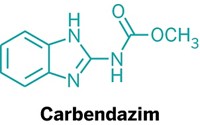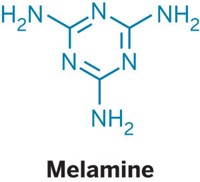Advertisement
Grab your lab coat. Let's get started
Welcome!
Welcome!
Create an account below to get 6 C&EN articles per month, receive newsletters and more - all free.
It seems this is your first time logging in online. Please enter the following information to continue.
As an ACS member you automatically get access to this site. All we need is few more details to create your reading experience.
Not you? Sign in with a different account.
Not you? Sign in with a different account.
ERROR 1
ERROR 1
ERROR 2
ERROR 2
ERROR 2
ERROR 2
ERROR 2
Password and Confirm password must match.
If you have an ACS member number, please enter it here so we can link this account to your membership. (optional)
ERROR 2
ACS values your privacy. By submitting your information, you are gaining access to C&EN and subscribing to our weekly newsletter. We use the information you provide to make your reading experience better, and we will never sell your data to third party members.
Policy
Chinese Baby-Food Crisis Widens
Melamine contamination of milk powder kills and sickens infants
by Sophie L. Rovner
September 18, 2008
A baby-food contamination crisis in China that came to the public's attention last week is growing worse by the day. On Sept. 17, China's minister of health, Chen Zhu, announced that three babies had died, more than 150 were suffering from acute kidney failure, and an additional 6,000 infants had become sick after drinking milk made from milk powder tainted with melamine. A day earlier, China's State Administration of Quality Supervision, Inspection & Quarantine (AQSIQ) reported that its nationwide inspections had detected the contaminant in milk powder produced by 22 companies, according to the country's official news agency, Xinhua.
Melamine is used to make plastics, fertilizer, and other products but is not approved as an ingredient in food. Yet this isn't the first time the compound has been detected in food produced in China. Last year, melamine-contaminated pet food sickened or killed thousands of cats and dogs in the U.S. The contaminant was traced to Chinese producers that added the nitrogen-rich compound to pet food ingredients to artificially inflate apparent protein content (C&EN, May 12, page 41).
Nor is this the first time that Chinese consumers have had serious problems with milk powder. In 2004, more than a dozen children died after consuming counterfeit milk powder that had very little nutritive value.
The current case first came to light in March, when major dairy product company Sanlu began receiving complaints about its milk powder, according to Xinhua. After investigating the matter the company recalled some of its products but didn't alert the public or the government. The situation gained widespread attention just this month after news reports linked the rash of health problems with the company's product. Sanlu publicly acknowledged the problem on Sept. 12.
Government tests showed that melamine content in the company's milk powder reached 2,563 mg/kg, Xinhua reported. After officials widened their investigation, they found melamine in milk powder made by other dairy product companies, including Yili Industrial Group and Mengniu, at levels ranging from 0.09 to 619 mg/kg.
China is taking several steps in response to the crisis. Authorities have arrested four milk dealers who allegedly mixed melamine into the milk they sold to the dairy product firms. The head of Sanlu and some local officials who oversee agriculture and food safety have been fired. The country is now providing free medical care for children affected by the melamine-laced milk.
AQSIQ inspectors are fanning out across China to keep an eye on production at dairy product companies. Li Changjiang, who heads the agency, said the country will alter its baby-formula standards to allow tests of poisonous substances such as melamine, Xinhua reported. He added that every dairy product on the market will be tested for melamine. Li said government tests show that dairy products provided for the Beijing Olympics and Paralympics were free of melamine.
The government has halted production and sales of the milk powder, and some of the companies have initiated recalls. Much of the food was produced for the Chinese market, although some was exported to Taiwan, Bangladesh, Myanmar, Yemen, Burundi, and Gabon.
The U.S. Food & Drug Administration issued a warning to consumers not to use the Chinese baby food. Although the milk powder isn't legally available in the U.S., the agency is investigating whether it is being sold in any stores that serve the Asian American community.





Join the conversation
Contact the reporter
Submit a Letter to the Editor for publication
Engage with us on Twitter